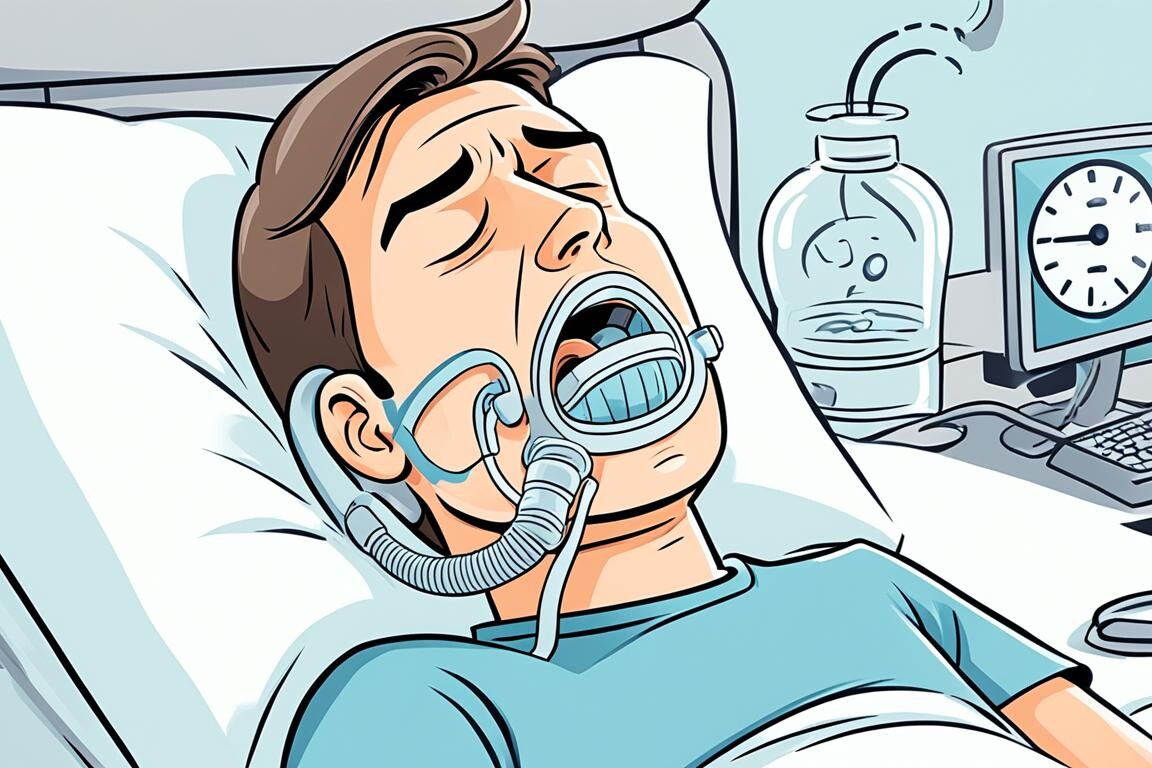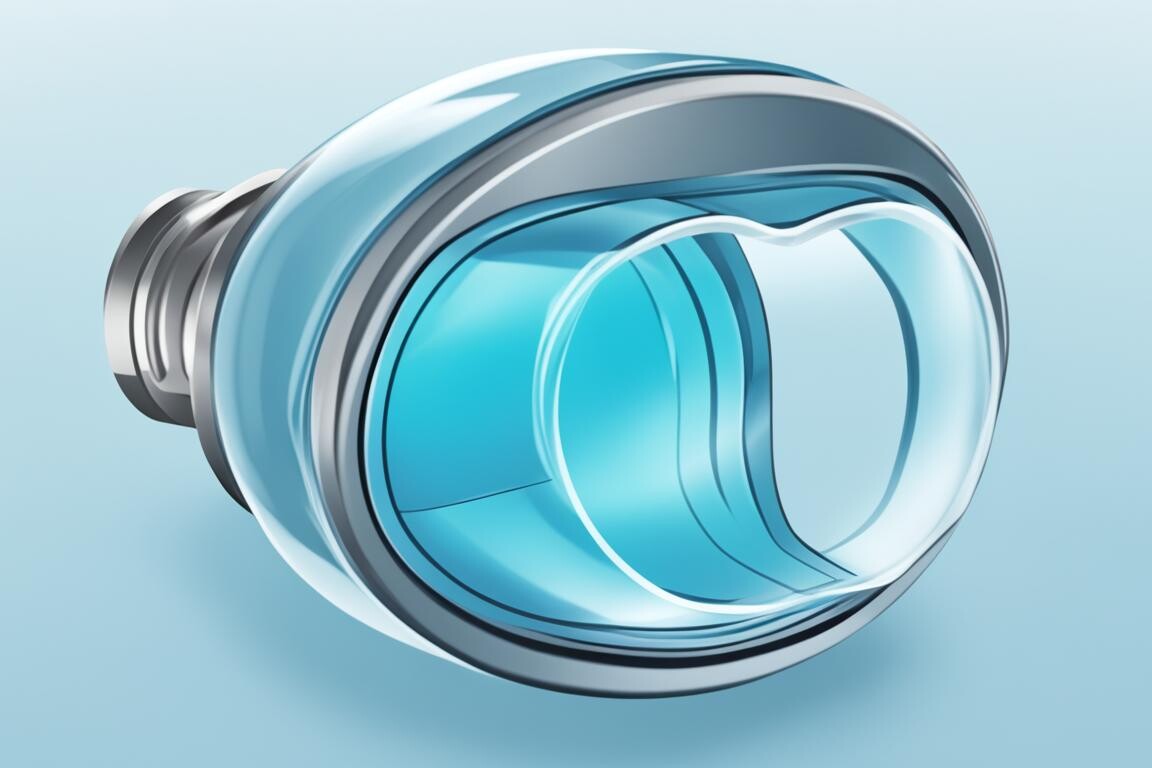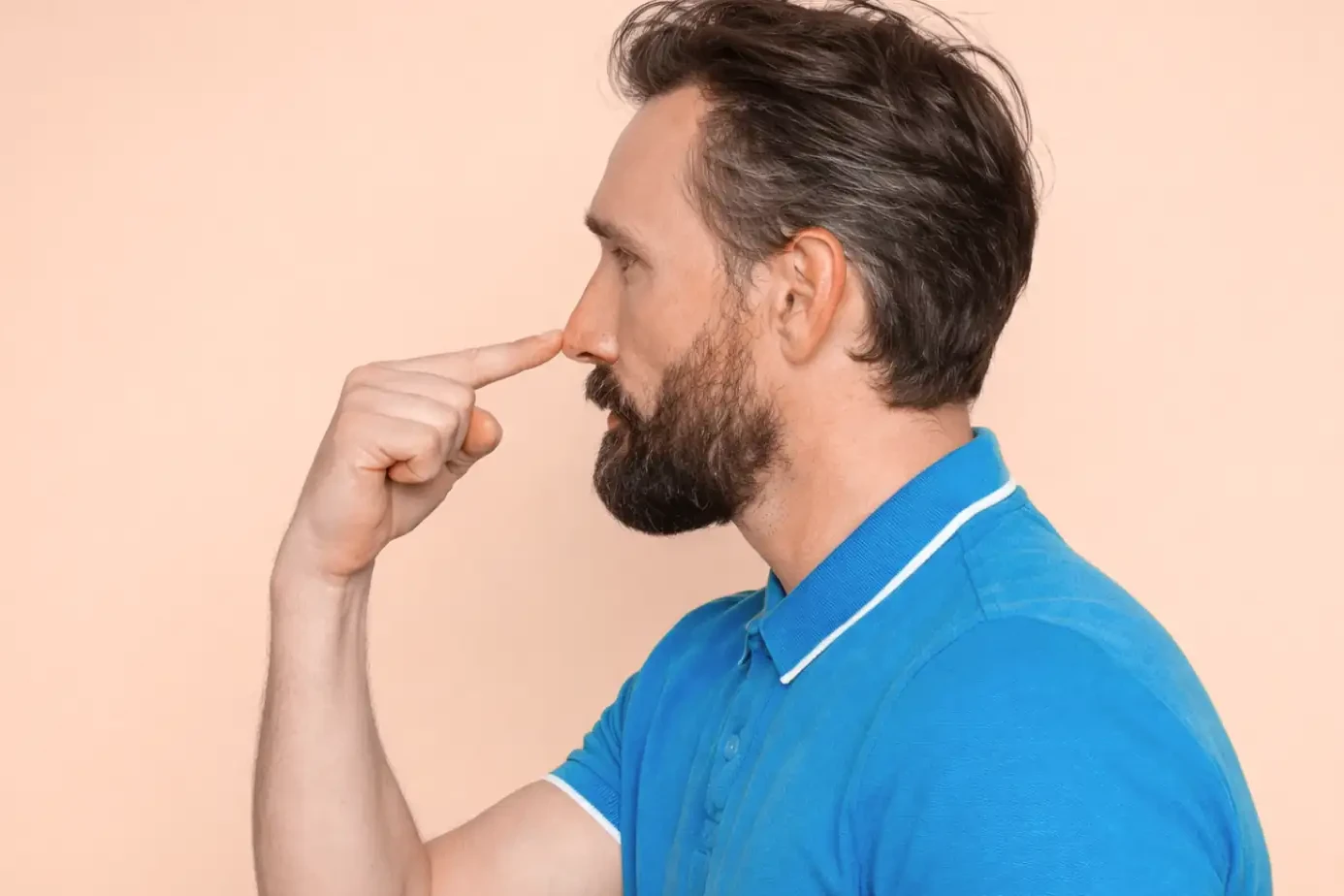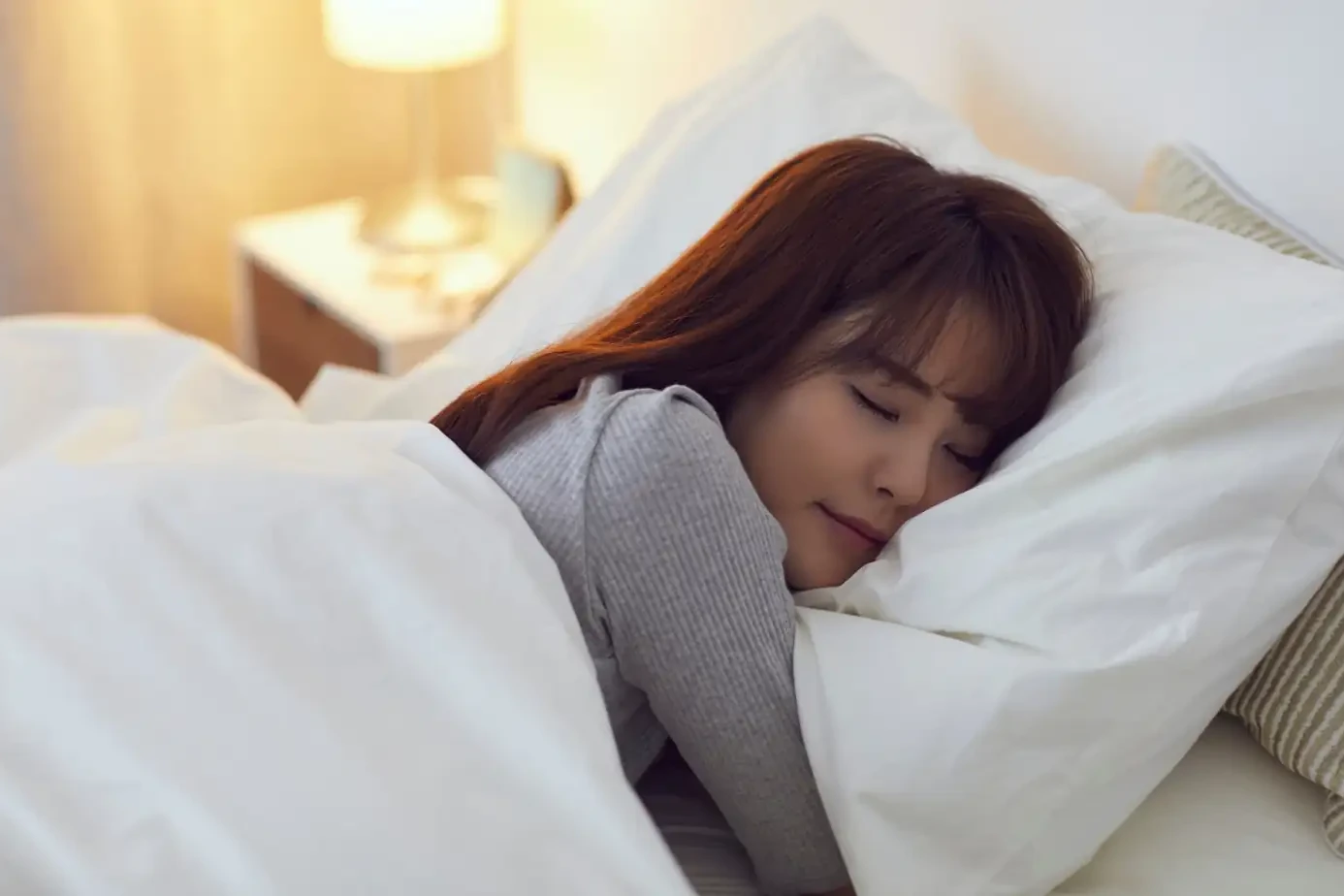Sleep is key for your mind, body, and feelings. But, it’s hard to get good sleep if you have obstructive sleep apnea (OSA). OSA makes you stop breathing for short times at night. This can lead to not getting enough sleep and increase your risk of serious health problems like heart issues and diabetes.
This article will share 5 tips to help you deal with sleep apnea insomnia. These tips can improve your sleep quality and help you take back control of your life.
Table of Contents
ToggleUnderstanding Sleep Apnea and Insomnia
Sleep disorders like sleep apnea and insomnia can greatly affect your health and happiness. Knowing what causes and shows these conditions helps you find the right treatment and sleep better.
What is Sleep Apnea?
Obstructive sleep apnea (OSA) is a common sleep issue. It happens when your airway partly or fully blocks, making you stop breathing for short times at night. This blockage is due to your throat muscles relaxing, which keeps airways open.
OSA leads to waking up often, not sleeping enough, and health problems if not treated.
Causes and Symptoms of Sleep Apnea Insomnia
Symptoms of sleep apnea insomnia include feeling very tired during the day, having trouble focusing, memory issues, and loud snoring. Things that might make you more likely to have sleep apnea include being overweight, having a family history of it, drinking too much alcohol, and certain body features like a narrow airway or big tongue.
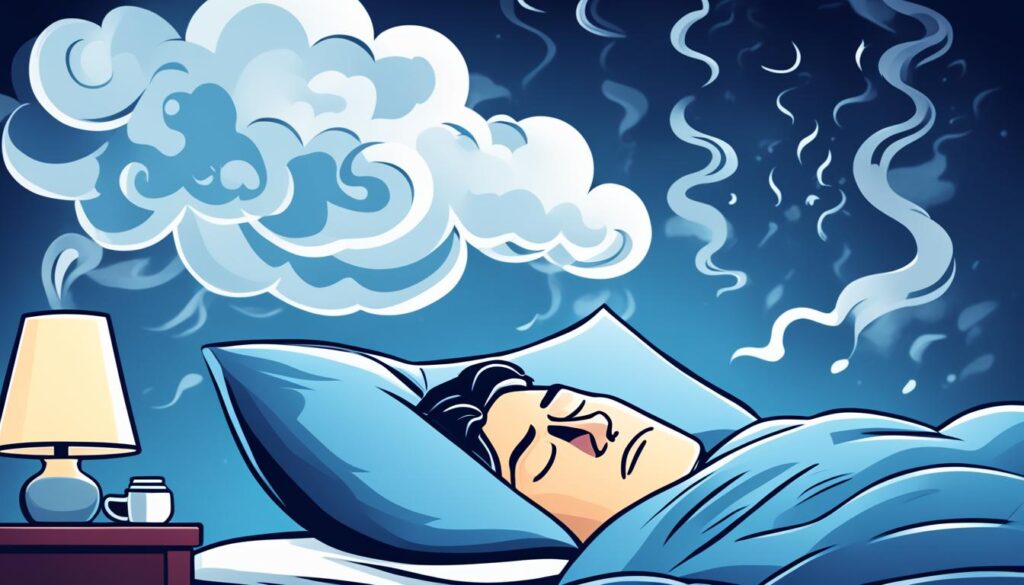
It’s crucial to deal with sleep apnea and insomnia quickly. They can raise the risk of high blood pressure, heart disease, and stroke. By knowing the causes and signs of these sleep problems, you can work on better sleep and health.
Establishing a Consistent Sleep Schedule
Keeping a regular sleep schedule is key for those with sleep apnea insomnia. Try to go to bed and wake up at the same time every day, even on weekends. This helps your brain and body get into a routine, which leads to better sleep.
Importance of Sleep Hygiene
Good sleep hygiene can make a big difference in how well you sleep. Stay away from blue light from devices before bed, as it can mess with your sleep cycle. Instead, do calming things like reading, stretching, or meditation to get ready for sleep.
Creating a Relaxing Sleep Environment
Your bedroom’s setup is key to good sleep. Make it cool, dark, and quiet for a calm space. Choose comfy bedding, like a supportive mattress and pillows, to help your body relax fully at night.
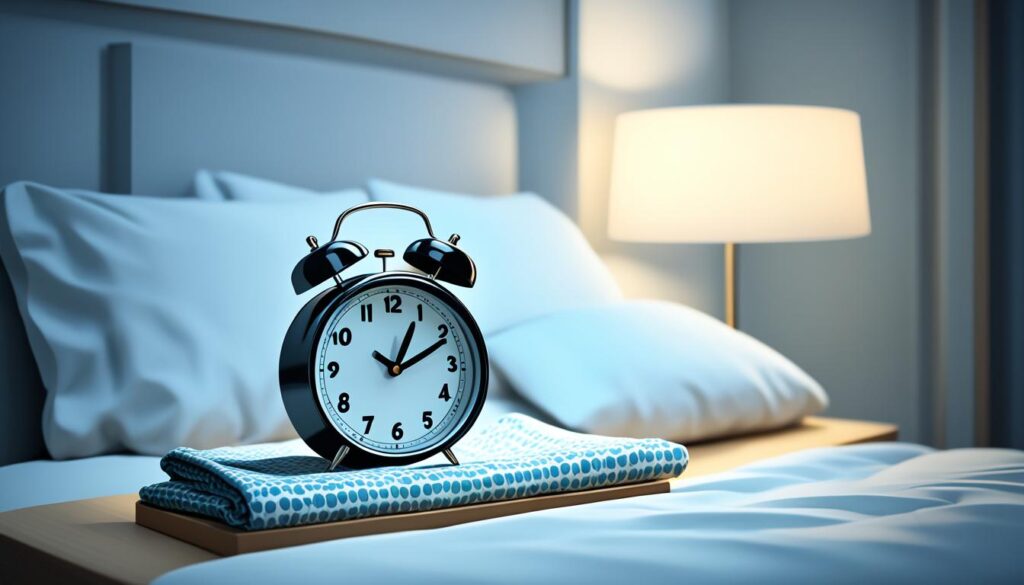
By sticking to a regular sleep schedule, following good sleep habits, and making your bedroom sleep-friendly, you’re on the right path. These steps can help you manage your sleep apnea insomnia and boost your sleep quality.
Using a Continuous Positive Airway Pressure (CPAP) Machine
The best way to treat sleep apnea is with a CPAP machine. This device sends air pressure into the airway, keeping it open. It stops the throat from closing during sleep. It’s important to find a CPAP mask and machine that fit you well for the best results.
CPAP machines have many options, like auto-adjusting pressure and different settings for breathing in and out. They also have special features for different types of sleep apnea. Using your CPAP machine every day, even when you’re traveling or taking naps, is key to keeping your airways open.
Keeping your CPAP machine clean and replacing parts on time is crucial. The right CPAP mask, like nasal, nasal pillow, full-face, or hybrid, can greatly improve your comfort. This makes it easier to stick with the treatment.
Working with your doctor or sleep specialist is important for using your CPAP correctly. They can help with issues like mask leaks, skin irritation, or trouble falling asleep with the mask on.
With the right CPAP and consistent use, you can manage your sleep apnea well. This improves your sleep quality and lowers the risks of breathing problems.
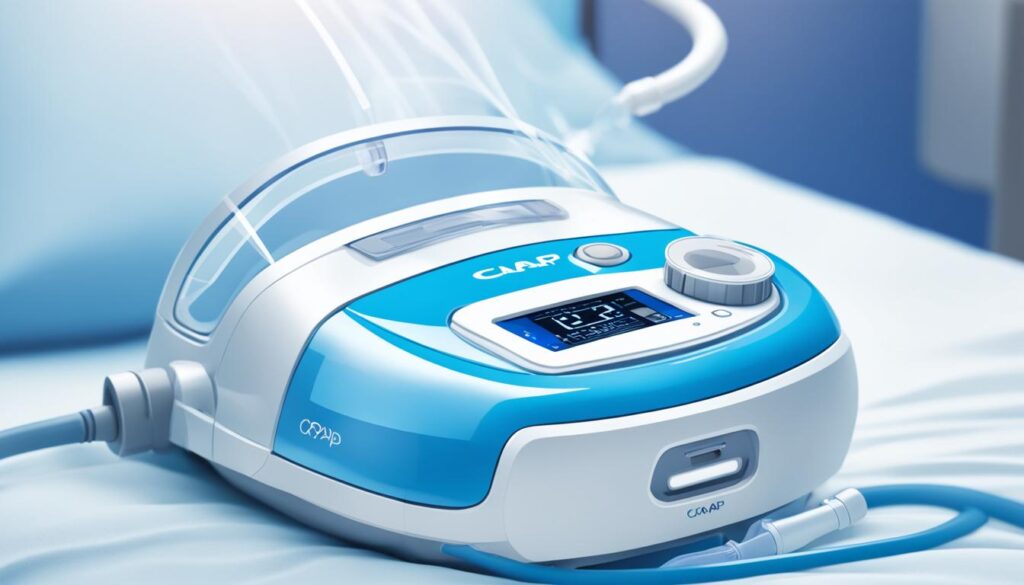
Optimizing Sleep Positioning
Your sleep position can greatly affect sleep apnea and snoring. [https://drchandrilchugh.com/blog/ways-to-reduce-stress-amidst-hectic-lifestyle/] Sleeping on your side is best because it lessens apnea and snoring.
Benefits of Side Sleeping
Sleeping on your side is good for those with sleep apnea. It keeps your airways open and lowers the chance of blockage. Studies link side sleeping to fewer sleep apnea episodes.
Stomach and Back Sleeping Considerations
Sleeping on your stomach can be good, but make sure your neck is in line with the right pillow. Avoid sleeping on your back if you can, as it might make sleep apnea worse. If you must sleep on your back, try using a wedge pillow or an adjustable bed frame to keep your airways open.
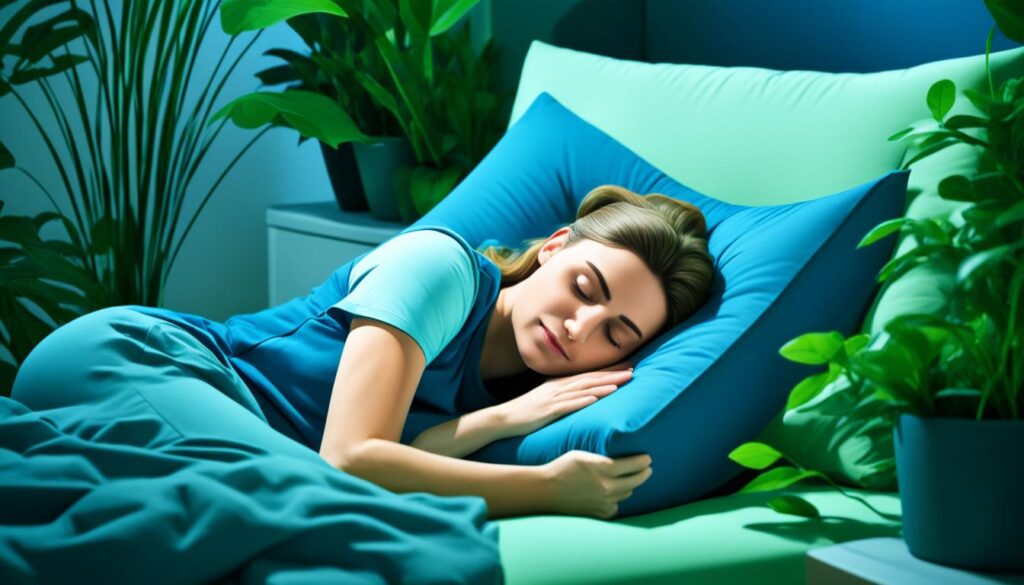
Finding the right sleep position is key to managing sleep apnea and snoring. Try different positions and talk to your healthcare provider for advice.
Exploring Dental Appliances for Sleep Apnea
For people with mild to moderate sleep apnea, dental appliances can be a good choice instead of CPAP therapy. These custom mouthguards, like MADs or TSDs, move the lower jaw forward slightly. This helps keep the airway open by tightening the throat muscles and tissues during sleep.
CPAP is the top treatment for sleep apnea, but dental appliances are an option for those who find CPAP hard to use or uncomfortable. Research shows MADs can cut down on breathing stops, snoring, and daytime sleepiness. TSDs also help reduce breathing pauses and make people feel less tired during the day.
About 90% of sleep apnea patients prefer MADs over TSDs, showing they are easier to use and more comfortable. For kids with sleep apnea, RME devices often help reduce symptoms and even cure it in some cases. Combining surgery with RME has been shown to work better than just one treatment alone.
Even though CPAP is the main treatment for sleep apnea, dental appliances are a good alternative for those looking for something more comfortable. With help from a dentist, people can see how these custom devices can help manage sleep apnea and improve their life quality.
Choosing the Right Pillow and Mattress
Finding the right pillow and mattress is key for those with sleep apnea insomnia. The right sleep setup can ease symptoms, boost sleep quality, and offer comfort.
Pillow Selection for Different Sleep Positions
Your pillow should match your sleep position. Side sleepers do well with a thick pillow that keeps the neck aligned and reduces shoulder pressure. Back sleepers might like a thinner pillow, while stomach sleepers should choose an even thinner one for spinal alignment. CPAP users might prefer pillows with special indents for the mask.
Mattress Considerations for Sleep Apnea
A supportive mattress that fits your sleep position can ease pressure points and enhance sleep quality. Mattresses last about 10 years, making them a big investment in your sleep. If your mattress is over a decade old and doesn’t support you well, it’s time for a new one.
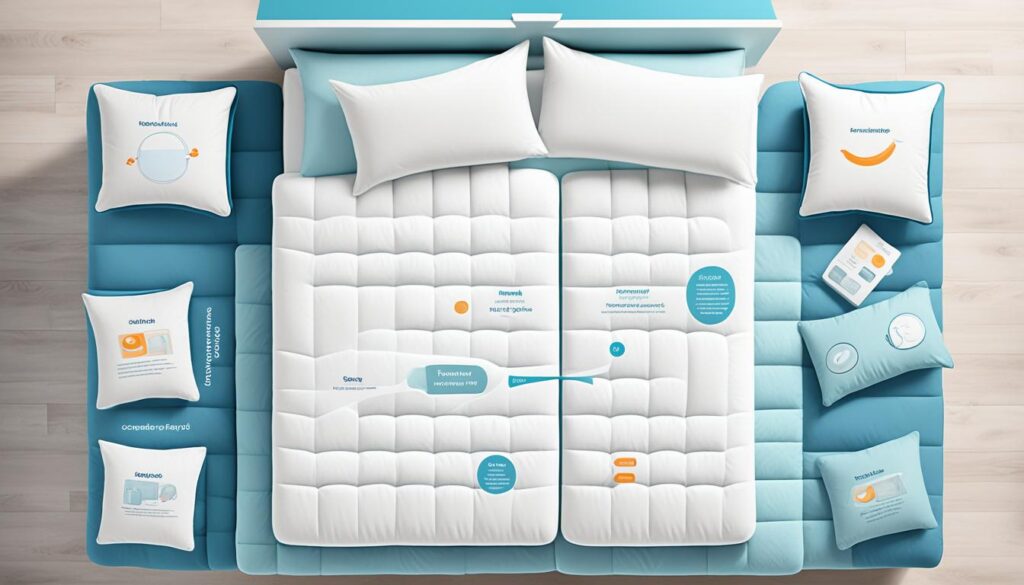
Choosing the right pillow and mattress can greatly improve sleep for those with sleep apnea insomnia. Tailoring your sleep setup to your needs can lead to better sleep and health.
Humidifying Your Bedroom
Keeping the right humidity in your bedroom is key for good sleep, especially if you use a CPAP machine for sleep apnea. Dry air can make sleep apnea worse, causing discomfort and problems with your CPAP therapy. A humidifier can help by keeping your mouth and throat moist.
Importance of Humidity for CPAP Users
Many CPAP machines have built-in humidifiers. But, some people might need an extra humidifier in their bedroom. This ensures the air stays moist, preventing dryness in dry places. It’s important to clean your humidifier often to stop mold and bacteria from growing, which can harm your sleep.
The Environmental Protection Agency says the best humidity for sleeping is 40% to 60%. This range helps you sleep comfortably without dry or too humid air bothering you.
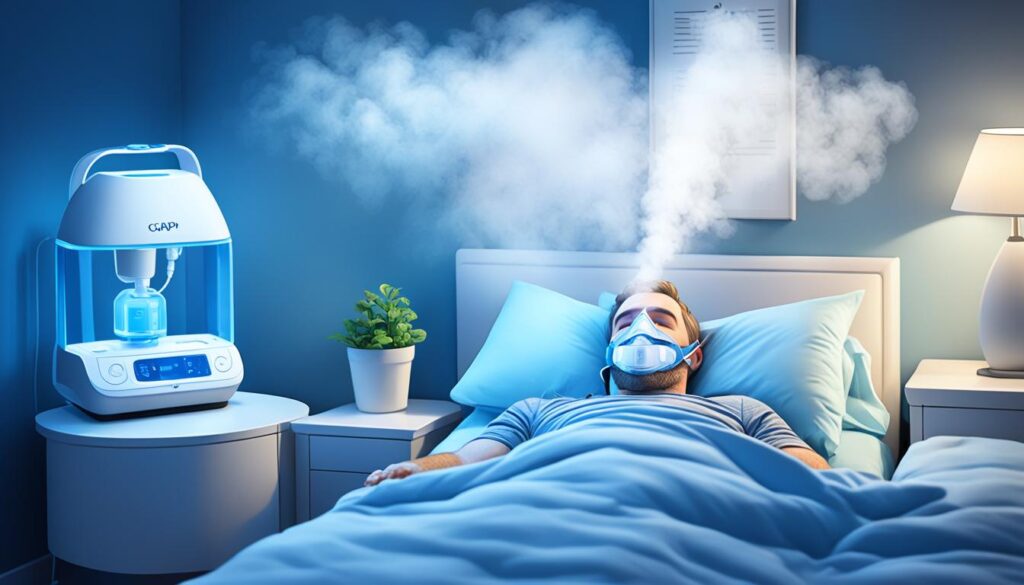
Adding a humidifier to your bedtime routine can make your sleep better and support your CPAP therapy. This easy step can greatly improve your sleep quality and health, helping you manage sleep apnea better.
Making Lifestyle Changes for Better Sleep
Healthy habits can make sleep apnea symptoms better. Keeping a healthy weight with a balanced diet and exercise helps. This is because extra fat can block the airways, making sleep apnea worse.
Even kids can get sleep apnea. It’s more common in obese adults because of fat blocking the airways.
Weight Management and Exercise
Weight loss, especially around the neck, can help breathing during sleep. Exercise improves sleep quality and oxygen levels. It also makes sleep apnea symptoms less severe.
Studies show exercise is good for people with sleep apnea.
Avoiding Alcohol and Smoking
It’s important to avoid alcohol and quit smoking. These habits can make snoring and poor sleep worse. Alcohol affects the muscles in the upper airway and can lead to weight gain.
Experts suggest not drinking alcohol for 3 to 4 hours before bedtime. Smoking is more common in people with sleep apnea, but the exact link is still being studied.
By making lifestyle changes like managing weight, exercising, and avoiding alcohol and smoking, sleep quality can improve for those with sleep apnea.
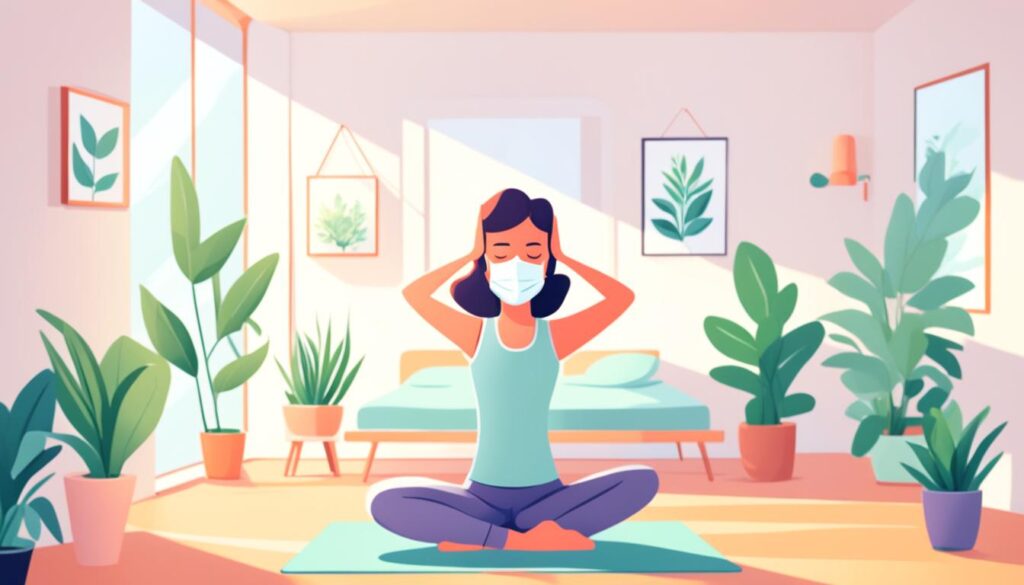
Trying Alternative Therapies
If you’re having trouble sleeping because of sleep apnea, you might look into other treatments. Traditional methods like CPAP machines and dental devices work well. But, some other ways might also help.
Playing Wind Instruments and Singing
Playing wind instruments and singing could be an interesting option. These activities require special breathing skills. This can make the muscles in your upper airway stronger, which might lessen sleep apnea symptoms.
For example, playing the didgeridoo, a wind instrument from Australia, has helped some people sleep better. It made them feel less tired during the day and reduced apnea episodes.
Even though there’s not much proof, trying these methods might be helpful along with your usual treatments. Always talk to your doctor before starting any new therapy. They can tell you about the good and bad parts.
- Herbal remedies like valerian, chamomile, and
- Acupuncture and relaxation techniques such as meditation and yoga
- CBD and cannabis products
- Sleep hypnosis
Always talk to your doctor before trying any new therapies. This makes sure they’re safe and right for you.
Sleep apnea insomnia
Sleep apnea and insomnia often go together. The breathing stops and sleep issues from sleep apnea can cause chronic insomnia. [https://www.verywellhealth.com/insomnia-vs-sleep-apnea-5213997] It’s important to find and fix the sleep apnea to improve sleep quality and daily life.
Health conditions, medicines, and lifestyle can lead to sleep apnea insomnia. Working with a doctor to find and manage these factors is key to solving the problem.
Diagnosing Sleep Apnea Insomnia
Doctors use questionnaires, sleep diaries, and actigraphy to diagnose insomnia and sleep apnea. A full check-up is needed to see if someone has both insomnia and sleep apnea (COMISA).
- Chronic insomnia affects roughly 1 in 3 people.
- 25–30% of men have sleep apnea, alongside 9–17% of women.
- Any individual who has either insomnia or sleep apnea has a 30–50% chance of having the other condition.
Treating Sleep Apnea Insomnia
Treating sleep apnea insomnia needs a full approach. Changing lifestyle habits, like keeping a regular sleep schedule and having a calming bedtime routine, can help. CPAP therapy might not work well for everyone, so other treatments like dental appliances could be used.
Cognitive Behavioral Therapy for Insomnia (CBT-I) is a good treatment for those with COMISA. It helps with the mental issues that cause insomnia. It’s important to work with a healthcare provider to get a treatment plan that covers both sleep apnea and insomnia.
Seeking Medical Treatment
If your sleep apnea symptoms don’t get better or get worse, you should see a doctor. Talk to a healthcare provider, like a sleep specialist. They can check you out and suggest the best treatment.
When to Consult a Doctor
You should think about seeing a doctor if you notice any of these signs:
- Loud, frequent snoring that disrupts your sleep or your partner’s sleep
- Daytime fatigue or sleepiness that interferes with your daily activities
- Difficulty breathing or gasping for air during sleep
- Frequent nighttime awakenings or difficulty staying asleep
- High blood pressure or other cardiovascular issues
Treatment Options for Sleep Apnea
Your doctor might suggest different ways to help with your sleep apnea, such as:
- Continuous Positive Airway Pressure (CPAP) devices to keep airways open while you sleep
- [Oral appliances] that move the jaw or tongue to stop airway blockage
- Surgical treatments to fix issues that cause sleep apnea
Getting diagnosed and treated early is key to avoiding serious health problems from sleep apnea.
Conclusion
Managing sleep apnea insomnia means making changes in your life, getting medical help, and trying new therapies. Start by keeping a regular sleep schedule. Use a CPAP machine as directed and sleep in a way that helps you breathe better. Also, choose healthy habits to fight sleep apnea insomnia and get back to good sleep.
Working with your doctor is key to beating sleep apnea insomnia. Together, create a plan that fits your specific needs. With the right approach and support, you can sleep better, feel healthier, and lower the risks linked to sleep problems.
Finding better sleep might take time and effort, but you can do it. Stay committed and try different ways to tackle sleep apnea insomnia. Putting your sleep first and taking steps to manage it can greatly improve your health and happiness.
FAQ
What is sleep apnea?
Obstructive sleep apnea (OSA) is a sleep disorder. It happens when the airway partly or fully blocks. This causes you to stop breathing for short periods at night.
What are the symptoms of sleep apnea insomnia?
Symptoms include feeling very tired during the day, trouble focusing, and memory issues. You might also snore loudly.
How can I establish a consistent sleep schedule?
It’s important to keep a regular sleep schedule. Try to go to bed and wake up at the same time every day. This helps your body and brain get into a healthy sleep cycle.
What is a CPAP machine and how does it help with sleep apnea?
A CPAP machine is a key treatment for sleep apnea. It sends air pressure into your airway to keep it open. This stops your throat from closing during sleep.
How does sleep positioning affect sleep apnea?
Sleeping on your side is best for sleep apnea. It helps lessen apnea and snoring. Sleeping on your stomach can also help, but back sleeping might make it worse.
Can oral appliances be used to treat sleep apnea?
Yes, for mild to moderate sleep apnea, oral devices can be an option instead of CPAP. These devices move your lower jaw forward to open your airway at night.
How can the right pillow and mattress help with sleep apnea?
The right pillow and mattress can greatly improve sleep apnea. Side sleepers need a thick pillow for neck alignment and comfort. CPAP users might prefer special pillows designed for their devices.
How can a humidifier help with sleep apnea?
A humidifier can make your bedroom more comfortable for sleep apnea and CPAP users. Dry air can make your mouth and throat dry, which can be uncomfortable and affect your CPAP therapy.
What lifestyle changes can improve sleep apnea symptoms?
Healthy habits can help with sleep apnea. Eating well and exercising can reduce sleep apnea severity. Avoiding alcohol and quitting smoking is also key to better sleep quality.
Can alternative therapies help with sleep apnea?
Yes, activities like playing wind instruments and singing might help with sleep apnea. These activities strengthen your upper airway muscles, which can lessen sleep apnea symptoms.
When should I seek medical treatment for sleep apnea?
If your symptoms don’t get better or get worse, see a doctor. A sleep specialist can check you and suggest the right treatment.
Source Links
About The Author

This article is medically reviewed by Dr. Chandril Chugh, Board-Certified Neurologist, providing expert insights and reliable health information.
Dr. Chandril Chugh is a U.S.-trained neurologist with over a decade of experience. Known for his compassionate care, he specializes in treating neurological conditions such as migraines, epilepsy, and Parkinson’s disease. Dr. Chugh is highly regarded for his patient-centered approach and dedication to providing personalized care.
→ Book a consultation to discover which remedies suit your needs best.

